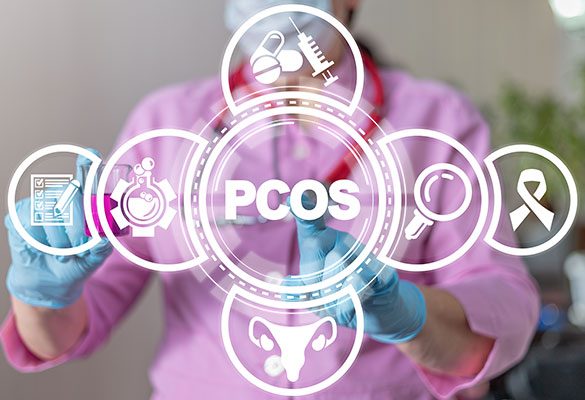PCOS & CAP

PCOS is the most common endocrine disorder among women between the ages of 18 and 44. When someone is infertile due to lack of ovulation, PCOS is the most common cause.
Polycystic ovary syndrome (PCOS) is a set of symptoms due to elevated androgens (male hormones) in females. Signs and symptoms of PCOS include irregular or no menstrual periods, heavy periods, excess body and facial hair, acne, pelvic pain, difficulty getting pregnant, and patches of thick, darker, velvety skin etc. Associated conditions include type 2 diabetes, obesity, obstructive sleep apnea, heart disease, mood disorders, and endometrial cancer.
PCOS is due to a combination of genetic and environmental factors. Risk factors include obesity, a lack of physical exercise, and a family history of someone with the condition. Diagnosis is based on two of the following three findings: no ovulation, high androgen levels, and small ovarian cysts detectable by ultrasound.
First line of treatment for PCOD is lifestyle correction which should include calorie controlled diet, weight loss and exercise. Short term hormonal support may help with improving the regularity of periods, excess hair growth, and acne.
Cell Activation with optimized nutrient food support will help to burn out excess fat, reduce weight and regain the lean mass fat mass ratio and omega 3 to 6 balance, the root cause of PCOS and prevent progression to metabolic syndrome and and associated health issues. In the starting phase regularisation of periods can be achieved with progesterone/ oral contraceptives. With reduction of fat mass inflammatory response and hormones production will be corrected and menstruation will regularise without hormonal support. Most probably spontaneous conception can occur those with subfertility. When the PCOS patient get pregnant after weight reduction and health optimization pregnancy complications like abortion, hypertension, diabetes etc will be less compared to overweight/ obese PCOS patients with pregnancy. If ovulation induction or any other treatment is needed the dose of medicine needed will be less after cell activation treatment and weight reduction.
Lifestyle correction and control of fat mass in the body should be continued, If not the condition may recur with weight gain and if over weight gain occurs during pregnancy, can lead to pregnancy complications. PCOS to be prevented/ corrected by lifestyle correction and the patient should take care in maintaining optimal body weight and abdominal circumference throughout life.
